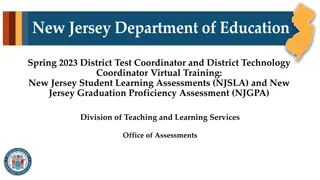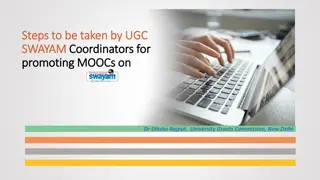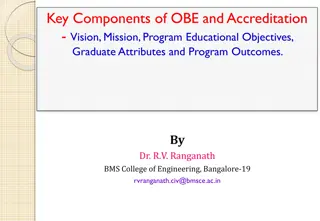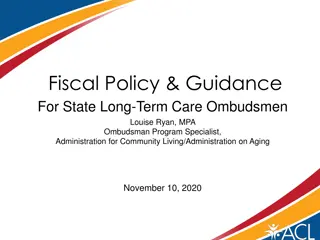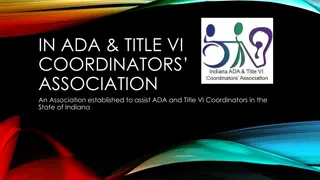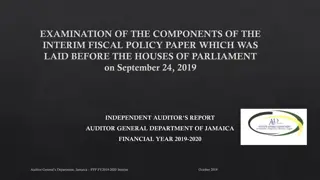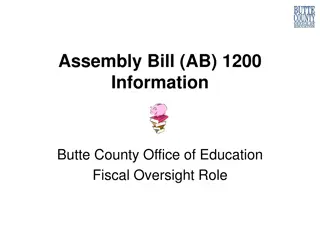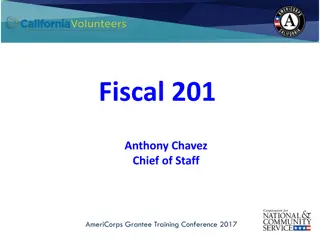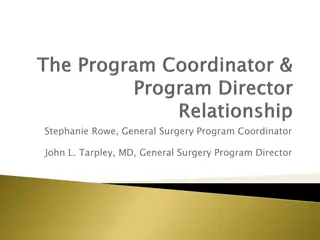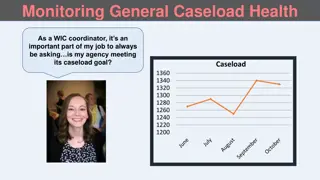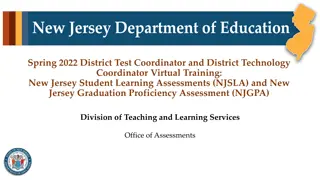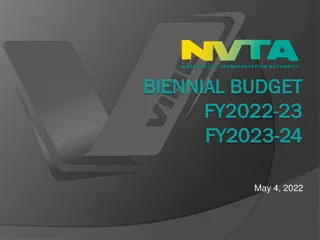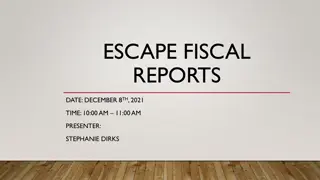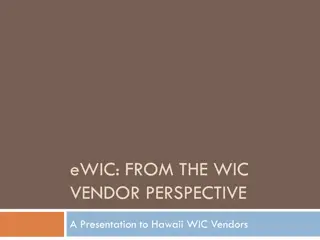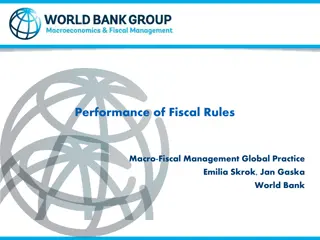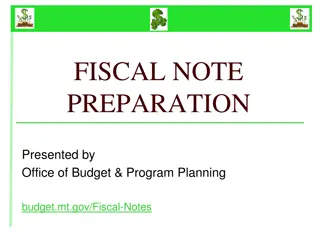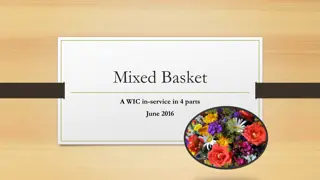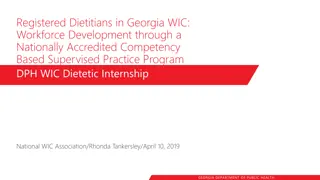WIC Fiscal Training for Local Agency Coordinators
This training aims to help local agency staff effectively utilize WIC grant awards, understand fiscal review standards, access technical assistance, and maximize program impact. Learn about the funding sources for WIC, including Nutrition Services and Administration (NSA) funds, Farm Direct Nutrition Program support, formula rebates, and Breastfeeding Peer Counseling grants.
Download Presentation

Please find below an Image/Link to download the presentation.
The content on the website is provided AS IS for your information and personal use only. It may not be sold, licensed, or shared on other websites without obtaining consent from the author.If you encounter any issues during the download, it is possible that the publisher has removed the file from their server.
You are allowed to download the files provided on this website for personal or commercial use, subject to the condition that they are used lawfully. All files are the property of their respective owners.
The content on the website is provided AS IS for your information and personal use only. It may not be sold, licensed, or shared on other websites without obtaining consent from the author.
E N D
Presentation Transcript
WIC fiscal training for local agency coordinators and fiscal staff
Objectives for this training Local agency staff can utilize their WIC grant award effectively to maximize program impact. Local agency staff will understand the fiscal review standards and reporting requirements. Local agency staff will know where to get technical assistance and answers to questions on different fiscal issues.
Where does WIC funding come from? Through regional office USDA Glossary of acronyms USDA United States Department of Agriculture OHA Oregon Health Authority PHD Public Health Division Through PHD OHA Your agency
Where does WIC funding come from? USDA OHA Your agency Distributes NSA $ Food $ Distributes NSA $ Uses NSA $ for program operations NSA (Nutrition Services and Administration) funding is used to pay for things like program administration, staffing, overhead, and paying for WIC services other than food. Food funding only pays for WIC food benefits and breast pumps. OHA distributes NSA funding to local agencies for their program operations. OHA uses food funding to handle all reimbursement of vendors for food benefits.
Other funding Farm Direct Nutrition Program USDA OHA State General Fund support for FDNP Glossary of acronyms FDNP Farm Direct Nutrition Program, also known as WIC Farmers Market Your agency Some agencies get funds from their organizations
Other funding OHA Formula rebates come from the formula company that provides WIC s contract formula. Rebate funds are used as part of WIC food dollars. Formula rebates Your agency
Other funding OHA Glossary of acronyms BFPC Breastfeeding Peer Counseling grants are provided to some local agencies. Funding for these grants is separate from other WIC funding and has a separate set of requirements. For more information see Policy 716 Breastfeeding Peer Counseling Program Requirements. BFPC grants Your agency
How is local agency funding determined? Each agency is assigned a caseload number based on how many participants they have been serving and the need in their service area. Assigned caseload determines your agency funding. Assigned caseload is set by the state WIC office every year in March for grant funding starting July 1. See Policy 305 Funding Formula for more information. Policy 305 Funding Formula Assigned Caseload The per participant rate is established by the state WIC office every year in March for grant funding starting July 1. The per participant rate and your assigned caseload determine the funding for your agency. Grant funding notification letters are sent from the state WIC office to agencies in May. Per participant rate
Smaller Agencies Receive Additional Money - Caseload Tier Tier 1 Agencies with a current assigned caseload equal to or greater than 5,000 No additional funding Tier 2 Agencies with a current assigned caseload greater than 1,500 and less than 5,000 No additional funding Tier 3 Agencies with a current assigned caseload greater than 1,000 and equal to or less than 1,500 $2000 additional funding per year Tier 4 Agencies with a current assigned caseload equal to or less than 1,000 $4000 additional funding per year
How do contracts work? The contract between the state Public Health LPHA office and Policy 310 Contract Process for Local Programs your agency is sent separately in May or June. The contract covers July 1 through June 30. Your local agency administrator signs and submits the contract to the LPHA office. See Policy 310 Contract Process for Local Programs for more information. If completed contracts are not submitted by the deadline, agencies will not receive their WIC funding on time. Policy 310 Contract Process for Local Programs Contracts Required expenditures The contract specifies required expenditure amounts for nutrition education (NE) and breastfeeding support and promotion (BF).
How are funds received? Agencies receive 1/12th of their total annual funding every month starting July 1. These payments are reconciled quarterly. There are certain situations where funds can be carried over to the next month. To understand how this works, you need to understand how WIC fiscal years work.
Understanding the 2 types of WIC fiscal years State Fiscal Year June July Aug Sept Oct Nov Dec Jan Feb Mar Apr May June July Aug Sept State fiscal year July 1 to June 30 WIC is run through a state agency Oregon Health Authority, Public Health Division and must follow their fiscal processes and rules. The WIC grant and contract match the state fiscal year July 1 through June 30.
Understanding the 2 types of WIC fiscal years Federal Fiscal Year June July Aug Sept Oct Nov Dec Jan Feb Mar Apr May June July Aug Sept Federal fiscal year October 1 to September 30 WIC is funded through a federal agency US Department of Agriculture, Food and Nutrition Services and must spend our annual grant within the federal fiscal year October 1 through September 30.
Understanding the 2 types of WIC fiscal years State and Federal Fiscal Year Overlap June July Aug Sept Oct Nov Dec Jan Feb Mar Apr May June July Aug Overlap Sept State fiscal year July 1 to June 30 New federal fiscal year October 1 to September 30 This leaves a 3 month overlap from July 1 through September 30. Funds from one federal fiscal year cannot be used in the next federal fiscal year. In order to close out the books for the federal fiscal year, funds from July 1through September 30 (1st quarter) of the state fiscal year have to be spent in that quarter and cannot roll-over to the next federal fiscal year.
Quarterly revenue and expense reports If agencies do not expend all of the funds received for the first quarter of the State Fiscal Year (July, August, September) by September 30, it cannot be recouped in future quarters. The State will take back any grant funds not expended in the first quarter. After the first quarter, funds may be expended in greater or lesser amounts each quarter as long as all of the funds are expended by June 30 (end of contract year). The State will take back any grant funds not expended in the second thru fourth quarters. Agencies must submit a Quarterly Revenue and Expense Report requesting funding for WIC operational expenses incurred for that period. See Policy 315 Fiscal Reporting for more info. Quarterly Revenue and Expense Report Policy 315 Fiscal Reporting
Quarterly revenue and expense report Quarterly revenue and expense report are due 30 days following the end of the first three quarters and 51 days after the end of the fourth quarter. If any expenditure report has not been received by its deadline, the WIC State payment to the local agencies could be delayed. third quarter first quarter second quarter fourth quarter October September January November February December March May August July April June
Underspending your WIC grant Underspending your WIC grant At the end of every quarter, there are a few agencies that have not submitted Quarterly Revenue and Expense reports showing they ve spent their full WIC grant. When the underspent amount is significant, the State WIC office sends out underspent notices to these agencies in early February and May in hopes they can correct it at the end of the end of the 2nd and 3rd quarters.
Use it Use it don t lose it! Avoid underspending your WIC grant don t lose it! Avoid underspending your WIC grant new job aid on the WIC coordinators page new job aid on the WIC coordinators page How many awards do you have from State WIC? Nutrition Services Administration (NSA), Farm Direct Nutrition Program (FDNP), or Breastfeeding Peer Counseling (BFPC)? Not all WIC programs have all three know which your agency receives. Save your WIC grant award letters for documentation of the exact award amounts. Do you work closely with fiscal staff to review each award s expenses regularly? Meet at least quarterly, but monthly would be better. For the WIC NSA award, are payroll and other expenses correctly charged to one of these categories: client services, general administration, nutrition education, breastfeeding promotion?
Use it Use it don t lose it! Avoid underspending your WIC grant don t lose it! Avoid underspending your WIC grant new job aid on the WIC coordinators page new job aid on the WIC coordinators page If an underspent amount is found for any award, do you have a strategy to spend it? Have you received any quarterly expense underspent notices from the state? Have you checked with your fiscal staff about these notices? The State doesn t send out underspent notices for relatively small amounts. Do you and your fiscal staff know underspent Q1 (Jul - Sept) awards cannot be carried over to Q2-4 (Oct Jun)? Check with your fiscal staff in early September so you can adjust spending in time to avoid underspending in Q1. Do you and your fiscal staff know all Q2-4 awards must be spent by 6/30, and cannot to be carried over to the following fiscal year starting 7/1? What strategy would you use to make sure any remaining WIC funds are spent by 6/30?
WIC budget projection worksheet This worksheet must be completed and submitted by June 30 for the coming fiscal year. Instructions for submission are at the bottom of the form. Other fiscal requirements Annual budget forms are sent to local agencies in late May each year, after caseload letters have been sent out.
Farm Direct is not 100% federally funded. The amount available to spend on farm direct checks varies year to year depending on how much the state legislature allocates, and how many Farm Direct check booklets are assigned to your agency. Local agencies will be notified of their Farm Direct check booklet allocation and administrative funding prior to the beginning of the Farm Direct season. Other fiscal requirements A separate Farm Direct revenue and expenditure report must be submitted no later than January 30th for funds expended for the previous season. Use the R&E report form instructions for details. Farm Direct may also be called the WIC farmers market mini grant/fresh veggie funding and WIC farmers market administrative funds.
FarmDirect Farm Direct Mini Grants are authorized for the period July 1st through December 31st, and are paid to local agencies as follows: 50% paid July 1st to WIC local agencies 50% paid October 1st to WIC local agencies Grant expenditures must be recorded/posted by December 31st Revenue and expenditure reporting can be submitted in the 1st and 2nd quarters or in the 2nd quarter only Final Farm Direct revenue and expenditure report is due on January 31st
Time studies Time study summaries must be submitted quarterly for the months of October, January, April and July. All staff who are paid directly (not by cost allocation) by the WIC grant during the time study month, must complete an individual time study. If the agency captures staff payroll by WIC categories CS, GA, NE, BF then individual time studies are not required. Time studies classify WIC work in four categories below. The majority of WIC staff time is usually spent in nutrition education and client services. Client services (CS) General administration and payroll (GA) Nutrition education (NE) Breastfeeding support and promotion (BF) Time studies are used to corroborate local agency expenses related to those 4 areas of WIC services. Time should be rounded to 15-minute increments, for example If it s 7 minutes, round up to 0 minutes; if it s 8 minutes, round up to 15 minutes. See Policy 316 Quarterly Breakout of Staff Time for more info.
Time studies - Q & A Question from Local Agencies (LA): Reported quarterly expenditures usually don t match up with time studies. Answer: LA WIC staff should work with their fiscal staff to better align payroll coding. The quarterly revenue and expense report records all the expenses for the whole quarter. WIC staff only complete a time study one month every quarter. The time study should be used as a guide to verify staff are documenting their WIC time accurately for payroll during the months they are not completing a time study. Question from LA: Shall LA WIC staff working on COVID-19 response add these hours to time studies? Answer: If staff are funded separately for working on COVID-19 and these hours are not funded by WIC, then do not report them on the time study. Question from LA: Shall LA staff not funded by WIC, but who do WIC work, report these hours on time studies? Answer: Occasionally, we have a special situation where local agencies report some in-kind hours on the lower half of the time study. This is not the norm. Agencies need to work with their NC and the State fiscal analysts to decide when reporting in-kind hours is necessary.
State WIC will reimburse local agencies for expenses incurred for attending required/mandated training and certain meetings (e.g. OWCA, data system training, Breastfeeding Basics). Travel and training State WIC uses the state guidelines regarding meal reimbursements. Reimbursement requests must be submitted to the state by the agency within 4 weeks of the last travel date. The state reimburses the agency, not individual travelers. Reimbursed travel expenses should not be included in the local agency Quarterly Revenue and Expenses Report. Use the following forms and resources: Policy 340 Reimbursement for Travel Travel matrix and information (e.g. per diems, mileage rate, 70 mile rule) In-state reimbursement form Exemption request for travel expenses
What conferences does the state support? NWA conferences (1 if in person, 4 if virtual) and the Leadership academy How often does the state support attendance? Once per biennium (every 2 years) National WIC Association Conferences and Leadership Academy Who do they contact to request attendance? Email Laura Spalding, Nutrition and Local Services Manager, with a cc to your nutrition consultant and Tove Larsen . How many are eligible from each agency to attend conferences? 1 in person; 4 for virtual attendance. What needs to be paid out of pocket by the person/agency? The state will reimburse for registration fee, travel (air, baggage, and shuttle/taxi), hotel, and per diem. The county needs to pay first and then will be reimbursed. We CANNNOT reimburse individuals. Availability based on funding which is evaluated each biennium. What are allowable expenses? Registration, travel costs, hotel, and per diem meals. Who does the form get submitted to? Tove Larsen What is the reimbursement process? Complete the reimbursement form and submit it to Tove Larsen as soon as they can after the conference. Significantly delayed submission may not be paid.
Additional funding in certain circumstances If your agency is moving or expanding, you can complete an Application for Financial Support for Clinic Moving and Expansion for up to $5,000. Small agencies can complete an Application for Reimbursement for WIC Nutritionist Training Time to support up to 30 hours of training time for a new WIC nutritionist. Reimbursement is a available for IBCLC certification or recertification for qualified WIC staff. Applications for reimbursement must be completed. The state WIC office will sometimes offer one-time funding or mini-grants for specific projects. Reimbursement requirements will be provided when the funds are offered.
Cost allocation Allowable WIC expenses Local program overhead is often paid by cost allocation. Overhead can include rent, utilities, legal services, accounting services, administration, personnel/payroll services, county administration, etc. There is no specific percentage limit however, less than 20% of the total budget is generally considered reasonable.
Allowable WIC expenses Incentive purchases Incentive items for participant nutrition education are allowed under certain parameters. Staff incentive items are limited. See Policy 460 Program Incentive Items.
Allowable WIC expenses Capital purchases: Expenditures must be approved if the item to be purchased is over $2,500. Contact the state WIC office for pre-approval from USDA Western Region office. Capital Expenditure Approval Form.
Local agency fiscal monitoring and compliance review WIC biennial fiscal review is completed by the State Fiscal Compliance Specialist from the Office of Public Health Director. The fiscal compliance specialist will schedule the fiscal review either shortly before or shortly after the WIC biennial review.
Local agency fiscal monitoring and compliance review A fiscal compliance review is conducted to provide assurance that the local WIC agency has an accounting system with proper internal controls to identify and report revenues, expenditures and equipment provided by federal funds through the Oregon Health Authority (OHA). A period is selected for conducting the review. The accounting transactions for that period will be evaluated for accuracy and compliance with applicable federal and state regulations, Women, Infants and Children Program (WIC) policies and procedures.
Local agency fiscal monitoring and compliance review Instances of noncompliance, material discrepancies and other irregularities are considered findings of the review for which management response and corrective action is required within 60 days upon receipt of the fiscal reports.
Local agency fiscal monitoring and compliance review some areas of focus Fiscal Audit of Time Study Summaries The quarterly time study summary submitted to the State must accurately reflect the information recorded on individual staff WIC time study sheets, and individual staff time studies must accurately reflect what staff record on payroll records. Individual time studies for up to four employees are audited Compliance finding examples: The total hours on summary and individual time studies match but the activities do not. Time spent in other Program Elements is charged to WIC. An employee was absent, but their time was charged to WIC. Inventory of goods purchased with WIC funds For example: breast pumps, scales, laptops, printers, HemoCue machines Allowable Costs Verification WIC funds used for only allowable costs
Fiscal policy links Policy 300 Fiscal Overview Policy 305 Funding Formula Policy 310 Annual Plan/Contract Payment Process for Local Programs Policy 315 Fiscal Reporting Requirements Policy 316 Quarterly Breakout of Staff Time Policy 320 Fiscal Review of Local Programs Policy 325 Caseload Management Policy 330 Penalty for Underspending Food Budget
WIC COORDINATOR RESOURCES Fiscal Overview and Tools
For more information Most resources listed in this training are on the WIC Coordinator webpage . Your assigned state nutrition consultant can answer many questions. For more specific questions, contact the state office to reach the following: For help with: Budget questions Time studies Travel reimbursements Quarterly expenditure reports State contact Fiscal Coordinator Karen Shi Fiscal Analyst Tove Larsen Fiscal Analyst Tove Larsen Fiscal analyst at the LPHA team of the Public Health Director s Office State Fiscal Compliance Specialist - Toni Silbernagel Fiscal monitoring



